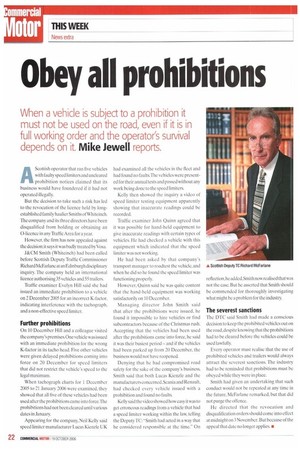Obey all prohibitions
Page 22

If you've noticed an error in this article please click here to report it so we can fix it.
When a vehicle is subject to a prohibition it must not be used on the road, even if it is in full working order and the operator's survival
depends on it. Mike Jewell reports. operator that ran five vehicles with faulty speed limiters and uncleared prohibition notices claimed that its
business would have foundered if it had not operated illegally.
But the decision to take such a risk has led to the revocation of the licence held by longestablished family haulier Smiths of Whiteinch. The company and its three directors have been disqualified from holding or obtaining an 0-licence in any Traffic Area for a year.
However, the firm has now appealed against the decision; it says it was badly treated byVosa.
J&CM Smith (Whiteinch) had been called before Scottish Deputy Traffic Commissioner Richard McFarlane at an Edinburgh disciplinary inquiry. The company held an international licence authorising 35 vehicles and 55 trailers.
Traffic examiner Evelyn Hill said she had issued an immediate prohibition to a vehicle on 2 December 2005 for an incorrect K-factor, indicating interference with the tachograph, and a non-effective speed limiter.
Further prohibitions
On 10 December 1-Till and a colleague visited the company's premises. One vehicle was issued with an immediate prohibition for the wrong K-factor in its tacho head. Five other vehicles were given delayed prohibitions coming into force on 20 December for speed limiters that did not restrict the vehicle's speed la the legal maximum.
When tachograph charts for 1 December 2005 to 21 January 2006 were examined, they showed that all five of these vehicles had been used after the prohibitions came into force.The prohibitions had not been cleared until various dates in January. Appearing for the company, Neil Kelly said speed limiter manufacturer Lucas Kienzle UK
had examined all the vehicles in the fleet and had found no faults.The vehicles were presented for their annual tests and passed without any work being done to the speed limiters.
Kelly then showed the inquiry a video of speed limiter testing equipment apparently showing that inaccurate readings could be recorded.
Traffic examiner John Quinn agreed that it was possible for hand-held equipment to give inaccurate readings with certain types of vehicles. He had checked a vehicle with this equipment which indicated that the speed limiter was not working.
He had been asked by that company's transport manager to roadtest the vehicle, and when he did so he found the speed limiter was functioning properly.
However. Quinn said he was quite content that the hand-held equipment was working satisfactorily on 10 December.
Managing director John Smith said that after the prohibitions were issued, he found it impossible to hire vehicles or find subcontractors because of the Christmas rush. Accepting that the vehicles had been used after the prohibitions came into force, he said it was their busiest period—and if the vehicles had been parked up from 20 December, the business would not have reopened.
Denying that he had compromised road safety for the sake of the company's business. Smith said that both Lucas Kienzle and the manufacturers concerried,Seania and Renault, had checked every vehicle issued with a prohibition and found no faults. Kelly said the video showed how easy it was to get erroneous readings from a vehicle that had a speed limiter working within the law, telling the Deputy TC: "Smith had acted in a way that he considered responsible at the time," On
reflection, he added, Smith now realised that was not the case. But he asserted that Smith should be commended for thoroughly investigating what might be a problem for the industry.
The severest sanctions
The DTC said Smith had made a conscious decision to keep the prohibited vehicles out on the road, despite knowing that the prohibitions had to be cleared before the vehicles could be used lawfully.
Every operator must realise that the use of prohibited vehicles and trailers would always attract the severest sanctions. The industry had to be reminded that prohibitions must be obeyed while they were in place.
Smith had given an undertaking that such conduct would not be repeated at any time in the future, McFarlane remarked, but that did not purge the offence. He directed that the revocation and disqualification orders should come into effect at midnight on 3 November. But because of the appeal that date no longer applies •


























































































































































































